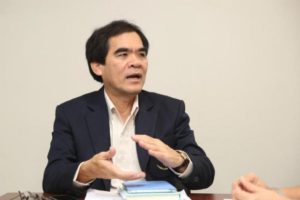
Egat eyes floating unit, LNG project – Move set to challenge PTT’s stranglehold
The Electricity Generating Authority of Thailand (Egat) is poised to set up a new business for importing liquefied natural gas (LNG) and developing floating storage re-gasification units (FSRU).
Saharat Boonpotipukdee, a deputy Egat governor and spokesman, said Egat has submitted a proposal for the business to the energy policymaker, which is expected to give its approval by the end of this month.
According to the tentative plan, Egat would develop its FSRU in the Gulf of Thailand to feed imported gas for the South Bangkok Power Plant and North Bangkok Power Plant via its new gas pipeline system. It is expected to import around 5 million tonnes of the gas annually.
He said the cost of the investment project has not been finalised. However, Egat is expected to start seeking business consultants and begin preparing human resources immediately if the project is approved.
“The feasibility study showed it is possible in both technical and economic aspects to commence the project. Egat can import LNG and develop its own FSRU,” said Mr Saharat.
He said Egat would buy LNG via a long-term contract from gas exporters in the Middle East and spot markets.
Egat’s new gas business does not plan on competing with PTT Plc, the country’s oil and gas conglomerate and sole importer of the gas, said Mr Saharat. Rather, it should enhance PTT’s ability to secure a gas pipeline network as Egat plans to develop a pipeline of its own, he said.
PTT’s main gas pipeline starts from Rayong and runs to the North Bangkok and South Bangkok power plants.
Nearly a decade ago, PTT was the sole company allowed to operate a gas business in Thailand. This year the Energy Regulatory Commission freed up regulation to allow other companies to operate gas businesses.
Although PTT’s gas imports for the power business remain intact, the company’s gas imports for the transport sector have recorded huge losses the past nine year because of universal energy price subsidies to keep domestic compressed natural gas (CNG) at a fixed rate.

PTT has installed 497 CNG pumps nationwide and spent over 100 billion baht in subsidising the CNG price. The subsidy ended earlier this year as the government agreed to float the price.
PTT’s executive officers were not available for comment about Egat’s plan to run its own gas business.
Mr Saharat said it would take around five years for Egat to prepare and develop all facilities before it starts operating a gas business.
Thailand’s Power Development Plan 2015-36 projects the country will import some 22 million tonnes of LNG a year, up from 4 million now.
Imports of LNG are expected to grow quickly to meet rising demand for power generation as gas from the Gulf of Thailand is depleting rapidly.
Yesterday Egat also announced a plan to develop another 2,000 megawatts of renewable power capacity from this year to 2026. That is well above its current solar power-generating capacity of 4MW from a pilot project solar farm in Prachuap Khiri Khan’s Thap Sakae district.
Egat generates renewable power mainly from hydropower plants, with more than 20 units nationwide and a combined capacity of 2,948MW, excluding hydropower plants in Laos.
He said Egat’s investment in the sector would range from solar to wind, biomass, biogas and waste-to-energy projects.
The first two projects it plans to develop are solar farms near the Krabi Power Plant and Mae MOH Power Plant with a capacity of 2MW each, said Mr Saharat.
Source: http://www.bangkokpost.com/business/news/1081652/egat-eyes-floating-unit-lng-project



